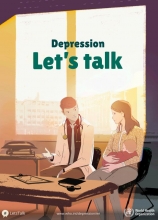Depression: Let's talk

MDD is a state of low mood in a person, character-ised by two weeks or more of persistent sadness, low energy and general loss of interest in activities that the person would normally enjoy.
This state often leads to anxiety, a sense of hopelessness and low self-esteem, affecting one’s relationships with family members and friends. MDD can affect everyone. The causes of MDD are unknown. Vulnerability to this condition likely reflects a combination of nature (genetic disposition) and nurture (social and physical environment).
The pressures of work and, worse still, the precarity of life for people in flexible and poorly-remunerated employment or without any form of livelihood, predisposes millions more to falling into depression now, than at any other time in human history. The consequences of this ticking time bomb can be fatal.
Every 40 seconds someone dies by suicide. Of those, 60% suffered from depression or other related forms of mood disorder. Suicide is preventable if we pay attention and can talk with our sisters, brothers, friends, neighbours and co-workers and urge them to get medical help if we notice signs of depression.
Post-natal depression affects one in every six women after childbirth. This can be treated with professional help. Talking and caring by family and friends is also invaluable at such moments.
Greater concern for mental health, including funding and professional training and re-training of care providers would go a long way in making professional help available for people battling with chronic cases of depression.
Further, placing people before profit, building a more humane society where the social and economic determinants of health are justly distributed are important for lifting the psychological and mental burden arising from debilitating material existence that triggers depression in so many people.

